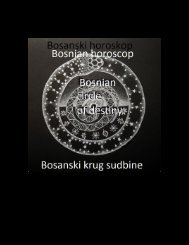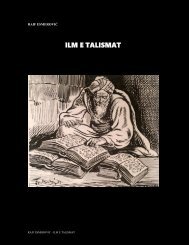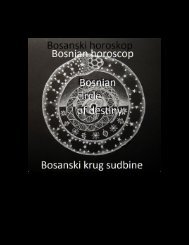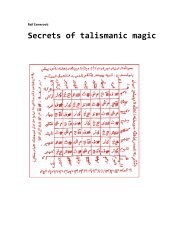Cult of fertility among the Bosnian People
In order to write credibly and in detail about the cult of fertility of the Bosnian people, it is necessary to start from the beginning which goes back to the ancient times and speaks about our famous forefathers the Illyrians, and one of their most important deities - snake. Namely, Illyrian cult of the snake as a primary symbol of fertility in folk religion of the Bosnian people, is not only noticeable in the belief about the home snake - protector of the family, i.e. totem of the head of the family, usually a male, i.e. father, but also her sacred meaning. The snake cult, on which the genesis of the grandfather of our forefathers is based on, has an even wider meaning and significance.
In order to write credibly and in detail about the cult of fertility of the Bosnian people, it is necessary to start from the beginning which goes back to the ancient times and speaks about our famous forefathers the Illyrians, and one of their most important deities - snake. Namely, Illyrian cult of the snake as a primary symbol of fertility in folk religion of the Bosnian people, is not only noticeable in the belief about the home snake - protector of the family, i.e. totem of the head of the family, usually a male, i.e. father, but also her sacred meaning. The snake cult, on which the genesis of the grandfather of our forefathers is based on, has an even wider meaning and significance.
- TAGS
- raif-esmerovic
Create successful ePaper yourself
Turn your PDF publications into a flip-book with our unique Google optimized e-Paper software.
caldron and was boiled until <strong>the</strong><br />
bones separated from <strong>the</strong> meat by<br />
itself. Then all <strong>the</strong> bones, large<br />
and small would be ga<strong>the</strong>red and<br />
placed in a casserole and so<br />
buried in <strong>the</strong> ground while <strong>the</strong><br />
meat was shared. Namely, it was<br />
allowed to <strong>the</strong> inhabitants <strong>of</strong> <strong>the</strong><br />
household to eat just a piece or<br />
two <strong>of</strong> <strong>the</strong> meat and <strong>the</strong> remainder<br />
<strong>of</strong> it had to be distributed. With<br />
this one would ensure <strong>the</strong> life <strong>of</strong><br />
<strong>the</strong> new-born child.<br />
Magic, religion and<br />
in<strong>fertility</strong><br />
Describing folk beliefs dedicated<br />
to <strong>the</strong> issue <strong>of</strong> <strong>fertility</strong> and<br />
magical encouragement <strong>of</strong> <strong>fertility</strong>,<br />
Rabija Hasanbegović (Folk belief<br />
for ensuring <strong>fertility</strong> in marriage)<br />
observes well that <strong>Bosnian</strong> folk<br />
usually ascribe in<strong>fertility</strong> to<br />
women, while it is rare to even<br />
consider sterility in men. This is<br />
<strong>of</strong> course a product <strong>of</strong> patriarchy<br />
but also an archaic understanding<br />
<strong>of</strong> women as a symbol <strong>of</strong> <strong>fertility</strong>.<br />
Humanity is taken away from barren<br />
women and <strong>the</strong>y are mockingly<br />
called jalovica (fruitless),<br />
barren, neroduša (childless).<br />
Under such social pressure women<br />
tried to achieve mo<strong>the</strong>rhood<br />
obsessively without choosing a<br />
method.<br />
Anthropological research, such as<br />
this, clearly show us how a longer<br />
time period <strong>of</strong> our history <strong>the</strong>re<br />
was no pr<strong>of</strong>essional medical<br />
knowledge and with that no<br />
tolerance towards persons,<br />
primarily women, which had this<br />
issue. Social scrutiny doesn't<br />
stop with humiliation <strong>of</strong> women but<br />
<strong>the</strong> entire family, namely, people<br />
believed that in<strong>fertility</strong> in women<br />
was god's punishment or a cause <strong>of</strong><br />
some curse. That's why a woman<br />
that couldn't get pregnant should<br />
give alms during nine months in<br />
<strong>the</strong> hope that this good deed will<br />
be rewarded with mo<strong>the</strong>rhood.<br />
In <strong>the</strong> past <strong>the</strong>re were numerous<br />
ways with which women tried to<br />
stimulate <strong>fertility</strong>. In order to<br />
get pregnant she would fumigate<br />
herself over balsam herb<br />
(Tanacetum balsamita) when her<br />
period ends, before she has<br />
intercourse. Some <strong>of</strong> <strong>the</strong>m<br />
practiced a method <strong>of</strong> mutual<br />
bathing with <strong>the</strong>ir husbands in<br />
water in which <strong>the</strong>y previously<br />
placed nine splinters from <strong>the</strong><br />
woodpile "so that children fall<br />
<strong>of</strong>f <strong>of</strong> her like splinters.", <strong>the</strong>n<br />
red and white turnip and "herb<br />
which grows in water and whose<br />
leaves are blinking." In certain<br />
customs social solidarity is noted<br />
with barren women to which fruits<br />
were gifted from a fruit grafted<br />
in spring, by people who own <strong>the</strong><br />
Raif Esmerović<br />
19<br />
<strong>Cult</strong> <strong>of</strong> <strong>fertility</strong> <strong>among</strong> <strong>the</strong> <strong>Bosnian</strong> <strong>People</strong>

















